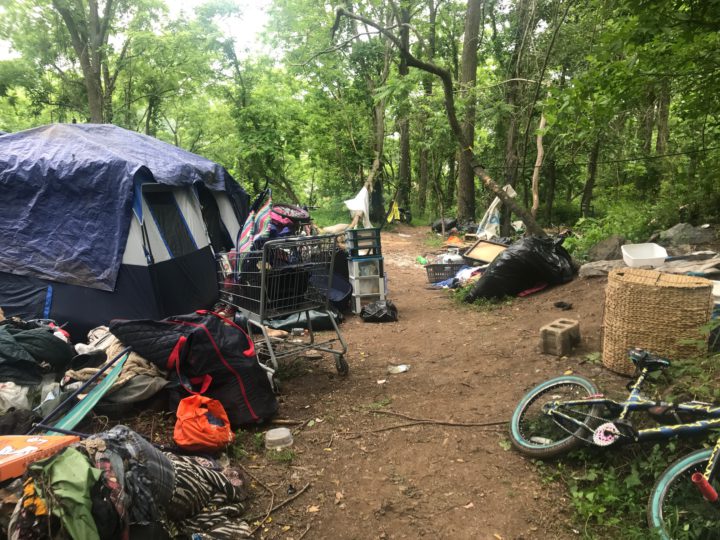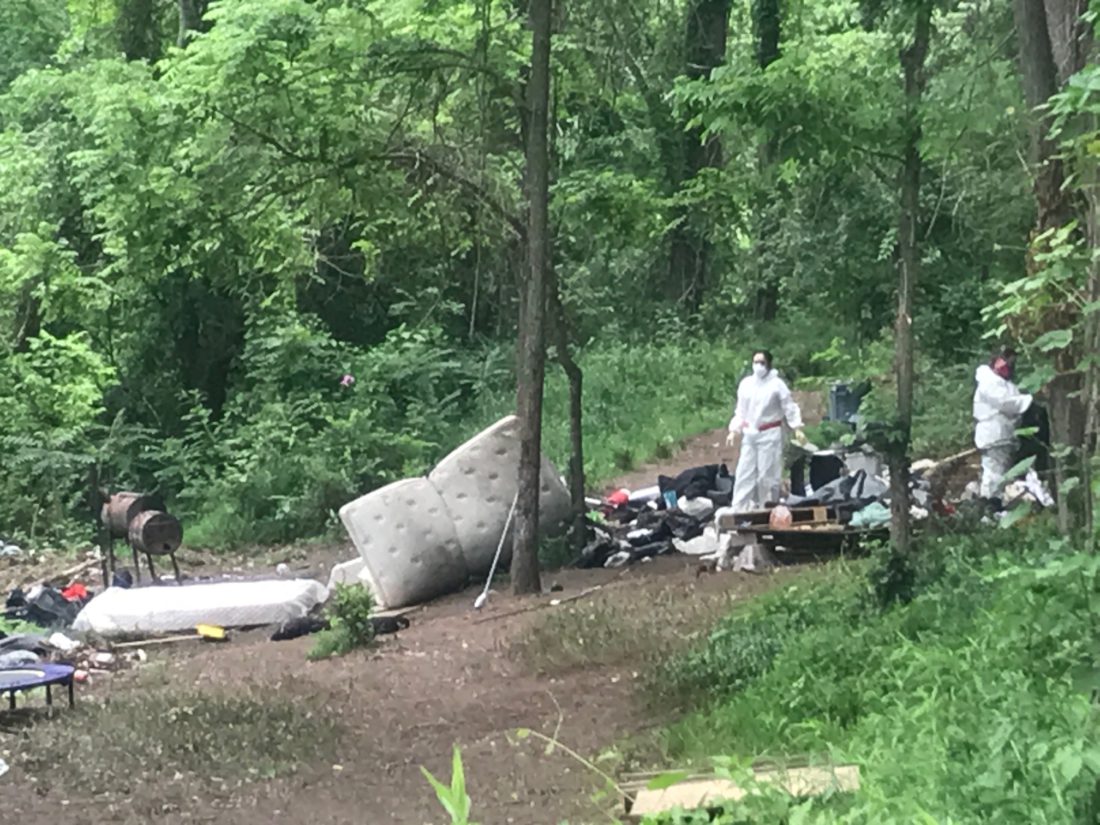June 7 dawned drizzly and humid, with wet grass and muddy patches, at Murray Hill Park on Bartlett Street. In a wooded area behind the nearby Bartlett Arms and Overlook Apartments, residents of a homeless encampment gathered their belongings to move, following a notice the previous day from the Asheville Police Department that they had to leave.
People had been living there for roughly a year, says Sarah Ramos, to whom Xpress spoke as she packed her tent. “Twenty-five to 30 people lost their homes now,” she said. “I don’t understand why we can’t stay. We’re not bothering anybody.”
Placed near the camp were a nondescript white van and two dumpsters. These belonged to Bio-One, a company specializing in crime scene, hoarding and suicide cleanup, with which the city of Asheville has contracted on eight occasions to clean homeless encampments.
The city of Asheville hires Bio-One for its ability to remove biohazardous material, such as needle litter and human waste, from the camps, explains Matt Gregg, who co-owns the Asheville-based company with his wife, Krista.
The contract for the Murray Hill cleanup, authorized by the city’s Parks and Recreation Department, was signed May 5 for up to $22,800. Estimated costs included up to $22,000 for seven-10 days of labor, including personal protective equipment and chemicals; up to $3,150 for dumpster rental; $2,650 for rental of a skid-steer loader and grapple bucket; and refuse disposal costs, listed as ‘TBD’ based on volume.
Gregg says both the city’s Parks and Recreation and Sanitation departments have contracted with Bio-One for cleanups, which have varied in scope. The Murray Hill cleanup was “probably the largest we’ve done,” he notes. (In a July 21 email, Kim Miller, the city spokesperson, writes “Parks and Recreation did and continues to carry sharps containers in their vehicles for collection of syringes found in City of Asheville parks. Although an effective daily practice, this did not meet the need posed by growing calls from the community for removal of hazardous materials being found on public property.”)
Dirty jobs
Bio-One lists homeless encampment cleanup as one of its services, but this work comprises just 5%-10% of the company’s business, says Gregg, a Fletcher resident who also owns a Bio-One franchise in Colorado. In addition to its eight cleanups on Asheville government property, the company has cleaned up several former encampments on private property in the city. Some of these jobs are relatively minor but involve cleaning up needle litter, he explains.
Cleaning residences for people dealing with hoarding or excess clutter makes up 40% of Bio-One’s jobs. Another 40% consists of trauma or crime scenes involving blood cleanup. Those jobs are usually suicides, but the company also handles homicides, attempted homicides, accidents and unattended deaths.
Gregg says his staff is trained to be “nonjudgmental” and strive for sensitivity. “You don’t necessarily know what’s going on in anyone’s life,” he says. Nearly all of his eight-person staff is trained in mental health first aid in preparation for what they might encounter on the job, Gregg continues.
“The motto of everything is ‘Help first, business second,” explains Gregg. “Whether it’s crime and trauma scenes, whether it’s the homeless encampments, whether it’s a hoarder [situation], we’re trying to deal with people with care and compassion.”
Health hazards
When Xpress arrived at the site of Murray Hill Park encampment, both a resident who was packing up and Bio-One staff were in possession of orange sharps containers of used needles. Harm reduction experts recommend that syringes be disposed in closed containers to discourage reuse and prevent the spread of HIV, hepatitis and other bloodborne illnesses.
Bio-One workers have received U.S. Department of Labor Occupational Safety and Health Administration training on bloodborne pathogens standards, says Gregg. “Sometimes we have the benefit of seeing the bright orange caps [of needles] and sometimes, unfortunately, we don’t.” He notes that discovering sharps containers, as at Murray Hill Park, is usually “the exception.”
Used needles are only one potential biological risk, and Gregg notes his staff wears full-body biohazard suits and protective eyewear. “The health hazards associated with needles tends to be the No. 1 [concern], but usually we’ll find buckets or bottles or different things — urine, feces, stuff like that,” he says.
Some encampments will have designated space that was used as a latrine area, Gregg continues. Campers typically use buckets as toilets, he says, but sometimes they use the ground. When feces or urine are on the ground, Gregg says, “Mother Nature tends to have an ability to take care of itself.” But Bio-One removes remaining feces and sprays the ground with proprietary chemicals, particularly a tuberculocidal disinfectant. (According to the federal Centers for Disease Control and Prevention, people who are homeless and people who inject drugs are both groups with high rates of tuberculosis transmission.)
Notice to go
Several city of Asheville ordinances restrict trespassing and camping on public property. At a Jan. 11 Asheville City Council meeting, APD representatives shared that the department had updated its 2014 Standard Operating Procedure on Persons Experiencing Homelessness (avl.mx/bt8); the department now gives people in an encampment 24 hours’ notice to vacate, down from a previous notice of seven days.
When asked about the timing of the Murray Hill Park clearing, APD spokesperson Bill Davis referenced this policy and referred additional questions to the Parks and Recreation and Sanitation departments.

Arms Apartments were packing up their belongings as employees of BioOne worked further down a hill. Photo by Jessica Wakeman, taken with residents’ permission
When asked what precipitated the notice to vacate Murray Hill Park, Miller, the city spokesperson, wrote in an email June 8, “The individuals camping inside Murray Hill Park were in violation of the city’s ordinances prohibiting camping on city property and in rights of way.”
Miller continued, “Several requests to remove the encampment have been received from community members over the past few months. Homeward Bound and Asheville Police Department worked to voluntarily relocate campers prior to cleanup.” (Homeward Bound of WNC provides supportive services for people experiencing homelessness, and operates on a Housing First model.)
‘Hey, this needs to be saved’
When Bio-One arrives at a homeless encampment, most residents have typically already left with any valuables, Gregg says. What’s left behind are typically “trash, debris, urine, feces, needles, spoiled food,” particularly food containers and empty cans, he explains. To his knowledge, Bio-One has not recovered weapons or illegal drugs from an encampment, but those items would be handed over to APD.
Xpress made multiple attempts to contact people who have been made to leave encampments, including Murray Hill Park but was unsuccessful.
Most everything collected constitutes solid waste as per the N.C. Department of Environmental Quality, and the company disposes of items at the Buncombe County Transfer Station in Asheville or the Buncombe County Landfill in Alexander. Gregg says the Murray Hill Park encampment left behind 100 tires, which were separated from landfill items for recycling.
“I don’t want to get rid of anything that somebody really wants to keep,” Gregg continues. “My main focus is to try to make a space safe, or to respond to whatever my client’s needs are — if they need things cleared out, if they need spaces free of all debris.”
His team does keep an eye out for belongings of real or perceived value, like personal documents, he says.
“We don’t immediately just start tearing through stuff,” Gregg explains. “If there’s anybody there, we’re having conversations. We’ve had many times where somebody’s like, ‘Hey, this needs to be saved,’ and we’ll set things off to the side.”




I felt like a good portion of the article about the removal of the homeless camp was not about its affects but about the company contracted to remove it???
Maybe homeless camps would be tolerated somewhat if the trash and needles were kept picked up by the camp residents. It appears there are means available to them to do so and they choose not to use them.